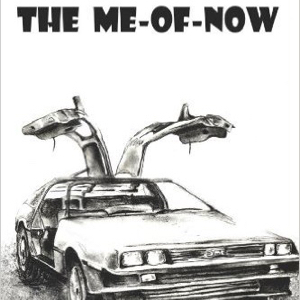I received an email from a friend the other day who had kindly taken the time to read my second story, The Me-Of-Now. He asked a fairly common question, How did you come up with this idea?
Without getting lost in my friend’s question (because the true but complicated answer is: I don’t really come up with story ideas as much as I stumble upon them; writing is an act of discovering as much as it is creating), here’s a little backstory on how I wrote that story.
(There are no spoiler alerts here—I’ll reveal nothing that might lessen a new reader’s experience.)
For those who haven’t already checked it out, The Me-Of-Now is a story set at a self-help conference that explores a question I find rather curious: If you could go back in time and change your past would you do it, even if doing so meant that you’d no longer be the person who had chosen to travel back in time?
The question presumes that if you were to change something in your past—the broken ankle in 7th grade; the case of bronchitis you contracted after your sophomore year of high-school, etc.—you would be a different you than the you who is reading this right now (an idea that is sometimes loosely referred to as The Butterfly Effect).
Last spring I was reading a lot of Nietzsche and thinking about his concept of the Eternal Return. What Uncle Freddy seems to be saying (and I’ll use this distancing and conditional modality because FN wasn’t the most systematic explainer) is that we should live our lives in such a manner that when we die, if someone offered us the chance to live again we’d do things exactly as we’d done. That is, we should live our lives in such a manner that our actions are chosen, volitional outcomes, an exercise of our wills, and thus when given the opportunity to go around again, we wouldn’t alter a thing.
It’s an ideal and arguably an absurdity, for none of us are that rational or that simple, and it seems undeniable to me that a gross majority of our actions are inexplicable (though we often call them otherwise), the complicated interweaving of biology and culture and history and all sorts of other things that we’ll never explain, or, if and when we finally and comprehensively do, we’ll have eradicated Mystery and cease to be what we currently understand ourselves to be.
This idea got stuck in my head for some time and I began to wonder about my-self: Would I change my past if I could, and if so, which parts? And what does my potential willingness to make changes to my past say about how I view my-self today? That is, do I like who I have-become/am-becoming today enough that I wouldn’t change past difficulties? Or am I unsatisfied with my current self such that if I could I’d go back and change my past, and hope that the me who came out of those changes would be happier than I currently am?
(Sorry for the unruly grammar; with these thoughts tenses can become unstrung and don’t hum their usual clear tones.)
That was the kernel of the idea. From there it seemed most interesting to place the story in a context that would have a certain bias to the question. What came to mind was a self-help conference, for to my mind most self-help programs teach that you need to love your-self in order to live a happy and fulfilled life. And obviously, if you love your-self today then to some degree you love your past-self (or at the least accept it or integrate it), and thus you would, like Uncle Freddy encourages us to aspire to, say No to the original question: you wouldn’t change your past if you could.
(I realize that there are arguable flaws in this logic. Specifically, one thing may not necessarily follow from another. It’s important to emphasize that I work as a fiction writer, not a philosopher. I’m not excusing shoddy-thinking; I am extolling the freedom to playfully engage with these ideas.)
Soon I found in my mind Peter. Peter is a person who, like most of us, has lived a life full of joys and great pains. He’s in his mid-40’s and often feels like something’s missing, or what he calls “off,” in his life. Like many of us, Peter might reasonably believe that he would be a happier person if certain difficult things hadn’t happened in his past, and he might very well want to un-do or change some of the hurtful and challenging things that have happened to him. I placed Peter in that self-help conference and had him fall under the sway of Robert Davidson, the charming and revered self-help guru.
To get a feel for Robert Davidson, I spent hours watching self-help/motivational speakers online, which was really quite enjoyable: if you have the means I highly recommend it. I read a lot of self-help literature and also drew from my experiences growing up in the church, where certain preachers were very engaging and dynamic in their weekly sermons. In the end, I hope Robert Davidson is a convincing character. I believe in him.
I don’t want to sound like a tease, but any more and I might ruin the story. If you’re curious you can follow this link and pick up a copy. Whether or not you do, maybe you’ll take a moment and think about the original question: Would you change your past if you could, even if you wouldn’t be you any more?
As Robert Davidson says, we’re all trying to become our Me-Of-Now. Maybe this will help.
